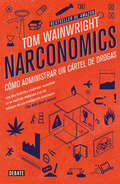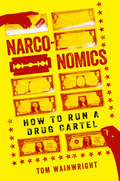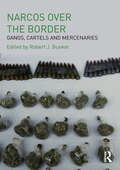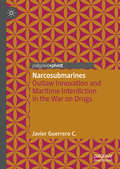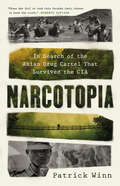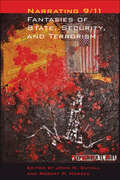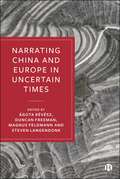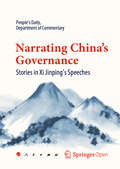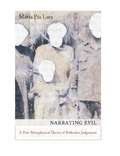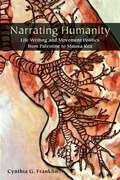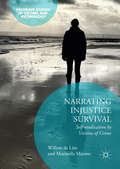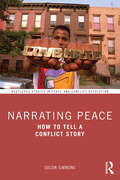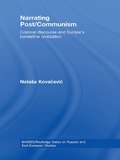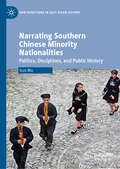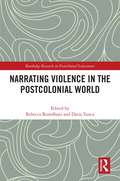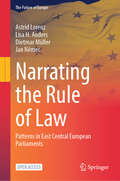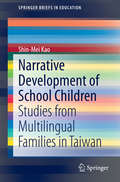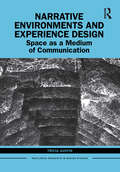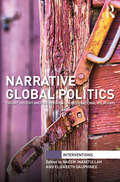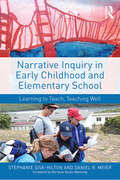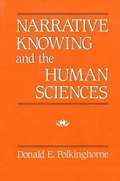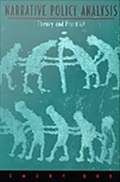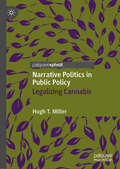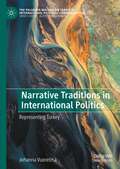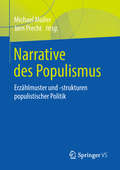- Table View
- List View
Narconomics: Cómo administrar un cartel de la droga
by Tom WainwrightTom Wainwright, reportero de The Economist, enseña las lecciones más importantes de economía y management detrás del funcionamiento de un cártel de drogas. Un libro que encantará a los lectores de Freakonomics o McMafia."Un libro de economía para la generación Breaking Bad" -The Times of London-¿Cómo puede ser exitoso (y sobrevivir) el jefe de una organización criminal que se está iniciando en el multimillonario negocio de los estupefacientes? Aprendiendo de los mejores, por supuesto. Desde la creación del valor de marca hasta poner a punto el servicio al cliente, las personas encargadas de administrar los cárteles de drogas han estudiado atentamente las tácticas y estrategias de corporaciones como Walmart, McDonald's y Coca-Cola.¿Y cómo pueden aprender los gobiernos a combatir este fenómeno? Si fueran conscientes de que los cárteles son compañías, los encargados de aplicar la ley podrían entender mejor su funcionamiento y dejarían de gastar millones de dólares en un esfuerzo inútil por ganar la "guerra" contra este negocio global y altamente especializado.El intrépido guía que conducirá al lector por los caminos de una de las industrias más salvajes en el planeta se llama Tom Wainwright. A través de los plantíos andinos de cocaína, las prisiones de Centroamérica, las tiendas de mota en Colorado o los sitios online de venta de drogas en la llamada Web Oscura (deep web), Wainwright brinda una mirada inédita y atrevida al comercio de drogas y sus 250 millones de consumidores.El elenco incluye a Bin Laden, el guía boliviano de la coca; al Viejo Lin, líder de una pandilla en El Salvador; a Starboy, el millonario roquero neozelandés productor de "pastillas para fiestas", así como a una amigable abuelita mexicana que cocina hot cakes de moras mientras planea un asesinato. Entre presidentes, policías y jóvenes matones, se explican asuntos importantes como el sofisticado simbolismo de los tatuajes, por qué los grupos delincuenciales deciden competir o coludirse, y las razones por las que los cárteles se preocupan de una manera sorprendente por la responsabilidad social corporativa.La crítica ha opinado:"Uno de los argumentos más concisos y convincentes que he leído a favor de una reforma legal sobre las drogas" -The New York Times-"Wainwright es uno de los periodistas con más suerte después de haber sobrevivido a su investigación" -The Washington Times-
Narconomics: How to Run a Drug Cartel
by Tom WainwrightThis is a unique look into the huge and fascinating multi-billion dollar international drug industry. Rather than reporting it as a "war,” Wainwight looked at the drug trade as a business, with a quarter billion customers and worldwide revenues of about $300 billion a year--with similar concerns as any Fortune 500 business, such as human resources, outsourcing and corporate social responsibility. Some of Wainwight’s insights to help turn the way we think about the war on drugs on its head include: *Supply and demand. Drug cartels, as monopoly-buyers, use tactics like forcing their suppliers, the farmers, to absorb price shocks when coca fields are eradicated, rather than absorb it themselves. *Research and development. The cartels have invested in innovative ways to increase yield from coca plants; so even though less coca is now grown, it yields more cocaine, thus keeping the supply chain in good shape. *Mergers and acquisitions. Why the violence and bloody battles of the Mexican cartels have been generated by opportunistic takeover attempts. *Competition and collusion. Why the mafias running El Salvador’s drug gangs realized that violent competition was hurting profits and opted for a strategy of collusion. *Social responsibility. How cartels "give back” to society by meeting social needs that governments have been unable to satisfy. *Media relations. How dedicated "press officers” communicate with (and threaten) local journalists to secure the kind of coverage the cartel wants and use the media to send intimidating messages to their rivals *Human resource models. How cartels, in a business with a high turnover of personnel because of all the killing use prisons as employment agencies and training academies to ensure a steady stream of new recruits for jobs that are risky and don’t pay particularly well. *Franchising. Lessons the cartels have learned from some of Fortune 500’s restaurant business'. Using classical economics and modern business theory to explain why drug cartels work in the way they do and based seven years of reporting in more than a dozen countries, Wainwright provides fascinating, humorous and novel insights into a multibillion-dollar worldwide industry and provides an innovative blueprint to address the drug problem, as well as a range of other criminal activities. If mobsters think like businessmen, law enforcers can thwart them by learning to think like economists.
Narcos Over the Border: Gangs, Cartels and Mercenaries
by Robert J. BunkerThe book takes a hard hitting look at the drug wars taking place in Mexico between competing gangs, cartels, and mercenary factions; their insurgency against the Mexican state; the narco-violence and terrorism that is increasingly coming over the border into the United States, and its interrelationship with domestic prison and street gangs. Analysis and response strategies are provided by leading writers on 3GEN gang theory, counterterrorism, transnational organized crime, and homeland security.Narcos Over the Border is divided into three sections: narco-opposing force (NARCO OPFOR) organization and technology use; patterns of violence and corruption and the illicit economy; and United States response strategies. The work also includes short introductory essays, a strategic threat overview, an afterword and selected references. Specific topics covered include: advanced weaponry, internet use, kidnappings and assassinations, torture, beheadings, and occultism, cartel and gang evolutionary patterns, drug trafficking, street taxation, corruption, and border firefights. This book was published as a special issue of Small Wars and Insurgencies.
Narcosubmarines: Outlaw Innovation and Maritime Interdiction in the War on Drugs
by Javier Guerrero C.This book is about the encounters of Colombian drug smugglers and the Colombian Navy, both in the open seas and along coastlines. Javier Guerrero C. specifically examines the technologies involved in the War on Drugs, such as the narcosubmarines and patrol boats, the knowledge required to transport drugs and the knowledge required to stop the illicit flows. The author presents compelling new evidence for advancing an understanding of technological innovation in antagonist contexts, as well as the symbiotic and co-evolutionary character of the process of technological innovation in the War on Drugs. This book will appeal both to practitioners and scholars interested in the War on Drugs and the production of technologies in outlaw contexts.
Narcotopia: In Search of the Asian Drug Cartel That Survived the CIA
by Patrick WinnThe gripping true story of an indigenous people running the world&’s mightiest narco-state—and America&’s struggle to thwart them. In Asia&’s narcotics-producing heartland, the Wa reign supreme. They dominate the Golden Triangle, a mountainous stretch of Burma between Thailand and China. Their 30,000-strong army, wielding missiles and attack drones, makes Mexican cartels look like street gangs. Wa moguls are unrivaled in the region&’s $60 billion meth trade and infamous for mass-producing pink, vanilla-scented speed pills. Drugs finance Wa State, a bona fide nation with its own laws, anthems, schools, and electricity grid. Though revered by their people, Wa leaders are scorned by US policymakers as vicious &“kingpins&” who &“poison our society for profit.&” In Narcotopia, award-winning journalist Patrick Winn uncovers the truth behind Asia&’s top drug-trafficking organization, as told by a Wa commander turned DEA informant. This gripping narrative shreds drug war myths and leads to a chilling revelation: the Wa syndicate&’s origins are smudged with CIA fingerprints. This is a saga of native people tapping the power of narcotics to create a nation where there was none before — and covert US intelligence operations gone wrong.
Narrating 9/11: Fantasies of State, Security, and Terrorism (A <I>Modern Fiction Studies</I> Book)
by John N. Duvall Robert P. Marzec.Contemporary fiction takes on 9/11, interrogating the global expansion of surveillance based on fantasies of US national security.Winner of the CHOICE Outstanding Academic Title of the Choice ACRLNarrating 9/11 challenges the notion that Americans have overcome the national trauma of the terrorist attacks on the World Trade Center and the Pentagon. The volume responds to issues of war, surveillance, and the expanding security state, including the Bush Administration’s policies on preemptive war, extraordinary rendition, torture abroad, and the suspension of privacy rights and civil liberties at home.Building on the work of Giorgio Agamben, Slavoj Žižek, and Donald Pease, the contributors focus on the ways in which post-9/11 narratives help make visible the fantasies that attempt to justify the ongoing state of exception and American exceptionalism. Narrating 9/11 examines a variety of contemporary narratives as they relate to the cultural construction of the neoliberal nation-state, a role that mediates the possibilities of ethnic and religious identity as well as the ability to imagine terrorism. Touching on some of the mainstays of 9/11 fiction, including Jonathan Safran Foer’s Extremely Loud & Incredibly Close and John Updike’s Terrorist, the book expands this particular canon by considering the work of such writers as Jess Walter, William Gibson, Lauren Groff, Ken Kalfus, Ian McEwan, Philip Roth, John le Carré, Laila Halaby, Michael Chabon, and Jarett Kobek. Narrating 9/11 pushes beyond a critical focus on domestic realism, offering chapters that examine speculative and genre fiction, postmodernism, climate change, and the evolving security state, as well as the television series Lost and the film Paradise Now.
Narrating China and Europe in Uncertain Times
by Ágota Révész, Duncan Freeman, Magnus Feldmann and Steven LangendonkThis edited volume examines the crucial, yet overlooked, role narratives play in the rapidly changing relationship between Europe and China. Its contributors analyse the role of narratives in different societies and arenas ranging from economic and foreign policy to history and social media. Emphasizing the social dimension of narrative, the volume challenges traditional state-centric and strategic approaches in international politics. It also engages with the ubiquity of stories about the “other” in present manifold crises, and underscores the need for a heightened awareness of narratives and their consequences in decision-making processes.
Narrating China's Governance: Stories in Xi Jinping's Speeches
by Department of People's DailyThis open access book captures and elaborates on the skill of storytelling as one of the distinct leadership features of Xi Jinping, the General Secretary of the Communist Party of China and the President of the People’s Republic of China. It gathers the stories included in Xi’s speeches on various occasions, where they conveyed the essence of China’s history and culture, its reform and development, and the principles of China’s participating in global governance and cooperating with other countries to build a community of common destiny. The respective stories not only convey abstract and profound concepts of governance in comparatively straightforward language, but also create an immediate emotional connection between the narrator and the listener.In addition to the original stories, extensive additional materials are provided to convey the original context in which each was told, including when and to whom Xi told it, helping readers attain a deeper, intuitive understanding of their relevance.
Narrating Evil: A Postmetaphysical Theory of Reflective Judgment (New Directions in Critical Theory #20)
by Maria LaraConceptions of evil have changed dramatically over time, and though humans continue to commit acts of cruelty against one another, today we possess a clearer, more moral way of analyzing them. In Narrating Evil, María Pía Lara explores what has changed in our understanding of evil, why the transformation matters, and how we can learn from this specific historical development.Drawing on Immanuel Kant's and Hannah Arendt's ideas about reflective judgment, Lara argues that narrative plays a key role in helping societies acknowledge their pasts. Particular stories haunt our consciousness and lead to a kind of examination and dialogue that shape notions of morality. A powerful description of a crime can act as a filter, helping us to draw conclusions about what constitutes a moral wrong, and public debates over these narratives allow us to construct a more accurate picture of historical truth, leading to a better understanding of why such actions are possible.In building her argument, Lara considers Greek tragedies, Shakespeare's depictions of evil, Joseph Conrad's literary metaphors, and movies that portray human cruelty. Turning to such philosophers and writers as Jürgen Habermas, Walter Benjamin, Primo Levi, Giorgio Agamben, and Ariel Dorfman, Lara defines a reflexive relationship between an event, the narrative of the event, and the public reception of the narrative, and she proves that the stories of perpetrators and sufferers are always intertwined.The process of disclosure, debate, and the public fashioning of collective judgment are vital methods through which we make sense not only of new forms of cruelty but of past crimes as well. Narrating Evil describes the steps of this process and why they are a crucial part of our attempt to build a different, more just world.
Narrating Humanity: Life Writing and Movement Politics from Palestine to Mauna Kea
by Cynthia FranklinIn Narrating Humanity, Cynthia G. Franklin makes a critical intervention into practices of life writing and contemporary crises in the United States about who counts as human. To enable this intervention, she proposes a powerful new analytical language centered on “narrative humanity,” “narrated humanity,” and “grounded narrative humanity” and foregrounds concepts of the human that emerge from movement politics. While stories of “narrative humanity” propagate the status quo, Franklin argues, those of “narrated humanity” and “grounded narrative humanity” are ones that articulate ways of being human necessary for not only surviving but also thriving during a time of accelerating crises brought on by the intersecting effects of racial capitalism, imperialism, heteropatriarchy, and climate change.Through chapters focused on Hurricane Katrina; Black Lives Matter; the Palestinian-led Boycott, Divestment and Sanctions movement; and the Native Hawaiian movement to protect Mauna a Wākea, Franklin reveals how life writing can be mobilized to do more than perpetuate dominant forms of dehumanization that underwrite violence. She contends that life narratives can help materialize ways of being human inspired by these contemporary political movements that are based on queer kinship, inter/national solidarity, abolitionist care, and decolonial connectivity among humans, more-than-humans, land, and waters. Engaging writers, artists, and activists who inspire radical forms of relationality, she comes to write side-by-side with them in her own acts of narrated humanity by refusing the boundaries between autobiography, community-based activism, and literary and cultural criticism.
Narrating Injustice Survival: Self-medication by Victims of Crime (Palgrave Studies in Victims and Victimology)
by Willem De Lint Marinella MarmoThis book explores the role of self-medication in reflexive response to victimhood and victim recovery. Based on interviews, counsellor focus groups and a self-medication survey, it situates self-medication among the coping strategies that may be set in formal and informal networks. Victims primarily seek validation, and this book reviews self-medication with particular focus on how victim-survivors develop a variety of reflexive responses in their attempt to carve out a dignified response to victimization. Validation may be achieved through the pursuit of justice, but many victims suffer from multiple or complex victimisation, with limited social chances necessary to achieve a just outcome. Routines, beliefs and an ordered pathway distinguish a dignified identity and more or less successful recovery adaptations. This book also addresses the practical implications of the findings for support organisations.
Narrating Peace: How to Tell a Conflict Story (Routledge Studies in Peace and Conflict Resolution)
by Solon SimmonsThis book provides practical tools, models, and frameworks for thinking about how a story is structured, all in order to help us think about conflict. Using examples from literature and films for developing narrative competence in everyday life, the book illustrates a new model of four basic plot types that can push a reader/viewer either toward political struggle (a justice or vindication story) or toward a journey of self-realization (a peace or reconciliation story). The examples used in the book span a wide array of conflict situations, from climate change to native American genocide, from reproductive rights and gender-based violence to Algerian independence and Arab identity, from Jim Crow segregation and civil rights to the Vietnam War and colonial collapse, from Latino educational opportunities to the liberation of Bengal and the emergence of the idea of the Global South. This simple-to-use model of story grammar is integral for the practice of both politics and peacemaking and opens a new window on literary analysis and the craft of storytelling. Along the way, it provides us with a new way to understand human purpose and offers precise definitions of the concepts of peace and justice.This book will be of great interest to students and practitioners of international relations, security studies, political theory, and peace and conflict/justice studies.
Narrating Post/Communism: Colonial Discourse and Europe's Borderline Civilization (BASEES/Routledge Series on Russian and East European Studies)
by Natasa KovacevicThe transition of communist Eastern Europe to capitalist democracy post-1989 and in the aftermath of the Yugoslav wars has focused much scholarly attention - in history, political science and literature - on the fostering of new identities across Eastern European countries in the absence of the old communist social and ideological frameworks. This book examines an important, but hitherto largely neglected, part of this story: the ways in which the West has defined its own identity and ideals via the demonization of communist regimes and Eastern European cultures as a totalitarian, barbarian and Orientalist "other". It describes how old Orientalist prejudices resurfaced during the Cold War period, and argues that the establishment of this discourse helped to justify transitions of Eastern European societies to market capitalism and liberal democracy, suppressing Eastern Europe’s communist histories and legacies, whilst perpetuating its dependence on the West as a source of its own sense of identity. It argues that this process of Orientalization was reinforced by the literary narratives of Eastern European and Russian anti-communist dissidents and exiles, including Vladimir Nabokov, Czeslaw Milosz and Milan Kundera, in their attempts to present themselves as native, Eastern European experts and also emancipate themselves – and their homelands – as civilized, enlightened and Westernized. It goes on to suggest that the greatest potential for recognizing and overcoming this self-Orientalization lies in post-communist literary and visual narratives, with their themes of disappointment in the social, economic, or political changes brought on by the transitions, challenge of the unequal discursive power in East-West dialogues where the East is positioned as a disciple or a mimic of the West, and the various guises of nostalgia for communism.
Narrating Southern Chinese Minority Nationalities: Politics, Disciplines, and Public History (New Directions in East Asian History)
by Guo WuBased on fieldwork, archival research, and interviews, this book critically examines the building of modern Chinese discourse on a unified yet diverse Chinese nation on various sites of knowledge production. It argues that Chinese ideology on minority nationalities is rooted in modern China's quest for national integration and political authority. However, it also highlights the fact that the complex process of conceptualizing, investigating, classifying, curating, and writing minority history has been fraught with disputes and contradictions. As such, the book offers a timely contribution to the current debate in the fields of twentieth-century Chinese nationalism, minority policy, and anthropological practice.
Narrating Violence in the Postcolonial World (Routledge Research in Postcolonial Literatures)
by Daria Tunca Rebecca RomdhaniThis book examines representations of violence across the postcolonial world—from the Americas to Australia—in novels, short stories, plays, and films. The chapters move from what appear to be interpersonal instances of violence to communal conflicts such as civil war, showing how these acts of violence are specifically rooted in colonial forms of abuse and oppression but constantly move and morph. Taking its cue from theories in such fields as postcolonial, violence, gender, and trauma studies, the book thus shows that violence is slippery in form, but also fluid in nature, so that one must trace its movement across time and space to understand even a single instance of it. When analysing such forms and trajectories of violence in postcolonial creative writing and films, the contributors critically examine the ethical issues involved in narrating abuse, depicting violated bodies, and presenting romanticized resolutions that may conceal other forms of violence.
Narrating the Rule of Law: Patterns in East Central European Parliaments (The Future of Europe)
by Astrid Lorenz Dietmar Müller Lisa H. Anders Jan NěmecThis open access book deals with the backsliding of the rule of law in Poland and Hungary as one of the main problems of the EU. What began as a national phenomenon has become a general threat for the EU because the respect for the rule of law is a prerequisite for all other values of the EU enshrined in Article 2 of the Treaty on European Union. Media coverage and scholarly publications on these developments mainly focus on backsliding governments and judicial decisions concerning the issue. This book aims to inform the debate by adding another perspective and providing a broader view. Drawing on a comprehensive collection of parliamentary debates, we explore how MPs in Poland, Hungary, but also the Czech Republic, Slovakia and Romania referred to the rule of law from 1990 to 2021 and how their narratives differed across parties, countries and time.
Narrative Development of School Children
by Shin-Mei KaoThis book reports the current aspects of children from multilingual families in Taiwan and describes these children's perceptions towards their linguistic, academic, and social development from a survey study and a discourse analysis study. The discourse analysis study focuses on the narrative developments of children born to Southeast Asian mothers versus average Taiwanese children across four grade levels in the elementary school. This book is significant in four aspects: describing the children with multilingual family background qualitatively and quantitatively, including a wide range and a large number of participants, proposing new analytical approaches for child narrative research, and compiling applicable classroom activities based on of research findings. The cultural and linguistic background of the children described in this book may be of interest to researchers and educators not only in Chinese-speaking regions, but also in areas where the phenomenon of multilingual family is becoming common in the society.
Narrative Environments and Experience Design: Space as a Medium of Communication (Routledge Research in Design Studies)
by Tricia AustinThis book argues narrative, people and place are inseparable and pursues the consequences of this insight through the design of narrative environments. This is a new and distinct area of practice that weaves together and extends narrative theory, spatial theory and design theory. Examples of narrative spaces, such as exhibitions, brand experiences, urban design and socially engaged participatory interventions in the public realm, are explored to show how space acts as a medium of communication through a synthesis of materials, structures and technologies, and how particular social behaviours are reproduced or critiqued through spatial narratives. This book will be of interest to scholars in design studies, urban studies, architecture, new materialism and design practitioners in the creative industries.
Narrative Global Politics: Theory, History and the Personal in International Relations (Interventions)
by Elizabeth Dauphinee Naeem InayatullahThis volume harnesses the virtual explosion of narrative writing in contemporary academic international politics. It comprises a prologue, an epilogue, and sixteen chapters that both build upon and diversify the success of the 2011 volume Autobiographical International Relations. Here, as in that volume, academics place their narratives in the context of world politics, culture, and history. Contributors explore moments in their academic lives that are often inexpressible in the standard academic voice and which, in turn, require a different way of writing and knowing. They write in the belief that academic IR has already begun to benefit from a different kind of writing—a stylae that retrieves the "I" and explicitly demonstrates its presence both within the world and within academic writing. By working within the overlap between theory, history, and autobiography, these chapters aim to increase the clarity, urgency, and meaningfulness of academic work. Highlighting the autoethnographic and autobiographic turn in critical international relations, this work will be of great interest to students and scholars in international relations, IR theory and global politics.
Narrative Inquiry in Early Childhood and Elementary School: Learning to Teach, Teaching Well
by Daniel R. Meier Stephanie Sisk-HiltonAs top-down educational reform policies at local and national levels increasingly isolate teachers from their own professional and instructional agency, and stultify children’s passion for learning, new techniques are needed for understanding and transforming educational practices. Narrative Inquiry in Early Childhood and Elementary School: Learning to Teach, Teaching Well facilitates meaningful change in early years education by providing early childhood and elementary school teachers with methods to incorporate narrative into their instruction and inquiry. This book offers practical strategies for incorporating narrative tools and structures into the classroom, and encouraging effective conceptual, pedagogical, and personal avenues for engaged teaching and learning across languages and cultures. The book’s chapters promote a lively discussion of central tenets of narrative inquiry and illustrative examples of teachers at work with narrative and inquiry for improving their practice and children’s learning.
Narrative Knowing and the Human Sciences
by Donald PolkinghorneThis book expands the concept of the nature of science and provides a practical research alternative for those who work with people and organizations. <p><p> Using literary criticism, philosophy, and history, as well as recent developments in the cognitive and social sciences, Narrative Knowing and the Human Sciences shows how to use research information organized by the narrative form―such information as clinical life histories, organizational case studies, biographic material, corporate cultural designs, and literary products. The relationship between the narrative format and classical and statistical and experimental designs is clarified and made explicit. Suggestions for doing research are given as well as criteria for judging the accuracy and quality of narrative research results.
Narrative Policy Analysis
by Practice TheoryNarrative Policy Analysis presents a powerful and original application of contemporary literary theory and policy analysis to many of today's most urgent public policy issues. Emery Roe demonstrates across a wide array of case studies that structuralist and poststructuralist theories of narrative are exceptionally useful in evaluating difficult policy problems, understanding their implications, and in making effective policy recommendations. Assuming no prior knowledge of literary theory, Roe introduces the theoretical concepts and terminology from literary analysis through an examination of the budget crises of national governments. With a focus on several particularly intractable issues in the areas of the environment, science, and technology, he then develops the methodology of narrative policy analysis by showing how conflicting policy "stories" often tell a more policy-relevant meta-narrative. He shows the advantage of this approach to reading and analyzing stories by examining the ways in which the views of participants unfold and are told in representative case studies involving the California Medfly crisis, toxic irrigation in the San Joaquin Valley, global warming, animal rights, the controversy over the burial remains of Native Americans, and Third World development strategies. Presenting a bold innovation in the interdisciplinary methodology of the policy sciences, Narrative Policy Analysis brings the social sciences and humanities together to better address real-world problems of public policy--particularly those issues characterized by extreme uncertainty, complexity, and polarization--which, if not more effectively managed now, will plague us well into the next century.
Narrative Politics in Public Policy: Legalizing Cannabis
by Hugh T. MillerThis book draws on examples from cannabis policy discourse and elsewhere to illustrate how individuals come to subscribe to a particular policy narrative; how policy narratives evolve; how narratives are employed in public policy discourse to compete with other narratives; and how, on implementation, the winning narrative is performed and subsequently institutionalized. Further, it explores how uncertainty and ambiguity are constants in public policy discourse, and how different factions and groups pursue different goals and aspirations. In the current climate of political reality, disputable facts and contestable goals, this book shows how different coalitions and ideologies use narratives to compete for policy dominance.
Narrative Traditions in International Politics: Representing Turkey (The Palgrave Macmillan Series in International Political Communication)
by Johanna VuorelmaThis book introduces the concept of narrative tradition to study representation in international politics. Focusing specifically on the case of Turkey, the book shows how narrative traditions are constructed, maintained, and passed on by a loose epistemic community that involves practitioners and experts including scholars, journalists, diplomats, and political representatives. Employing an interpretative approach, the book distinguishes between four narrative traditions in the study of Turkey: Turkey as a state that is (1) getting lost, (2) standing at a decisive crossroad, (3) led by strongmen, and (4) struggling with a creeping Islamisation.These narrative traditions carry enduring beliefs that not only describe, moralise, judge, and stigmatise Turkey, but also contribute to the idea of the West. The book focuses on knowledge that is produced from a Western perspective, showing that Turkey provides a channel through which the Western self can be debated, challenged, celebrated, and judged.
Narrative des Populismus: Erzählmuster und -strukturen populistischer Politik
by Michael Müller Jørn PrechtPopulistische Ideologeme und populistische Kommunikation beruhen auf Narrativen, also erzählerischen Grundmustern, die gesellschaftliche Denkmuster abbilden. Eine narrative Analyse dieser Muster führt zu einem besseren Verständnis des Phänomens des Populismus. In diesem Band setzen sich die Autoren mit diesen Erzählmustern und -strukturen populistischer Politik auseinander und stellen die Frage nach dem Zusammenhang politischer und medialer Diskurse im thematischen Feld des Populismus.Der InhaltPopulismus - Versuch einer begrifflichen Differenzierung • Umrisse des populistischen Narrativs als Identitätspolitik • Narrative der Demokratie • Volkserzählungen • Eklektizismus populistischer Narrative • Populistische Narrative im sozialen Netzwerk • Erzählformen des Populismus • Populismus in den LeitmedienDie HerausgeberDr. Michael Müller ist Professor für Medienkonzeption und Medienanalyse, Semiotik und Erzähltheorie. Er leitet das Institut für Angewandte Narrationsforschung (IANA) der Hochschule der Medien in Stuttgart.Jørn Precht ist Professor für Transmediales Storytelling, Dramaturgie und Stoffentwicklung für AV- und Online-Medien an der Hochschule der Medien in Stuttgart und leitet dort das Institut für Angewandte Narrationsforschung (IANA).
